Your donation will support the student journalists of Northeastern Illinois University's The Independent, either in writers' payment, additional supplies and other items of note. Your contribution will allow us to purchase additional equipment for writers/photographers/illustrators and cover our annual website hosting costs.
Image by HaticeEROL from Pixabay
NEIU Faculty Survey on Zoom Etiquette
March 9, 2021
It has been almost a year since Northeastern Illinois University transitioned to remote learning experience after the spring break of 2020 due to the pandemic related to COVID-19. Since then, Zoom has become a verb to describe any online meeting here at NEIU and everywhere else. In spite of the learning curve and occasional video/audio freezes, Zoom does bring a classroom to your home, virtually. And for students like Anusha Manahil, it can bring the university across the globe twelve hours ahead.
Although the Biden administration prepares to reopen the schools in the U.S. for in-person learning, some are predicting that Zoom is here to stay and the public should get used to it. If Zoom will continue to be part of our collective classroom experiences, should we ask if there are more effective ways to use this online video communication tool? Earlier in the semester, The INDEPENDENT asked teaching faculty of Northeastern Illinois University about their experiences with distance learning. We hoped to gain some insight on what the students of NEIU can do to make their Zoom experience a more effective pedagogical tool for the faculty.
- Turn the camera on (or not).
Whether to turn the camera on or off is a very controversial issue. However, the majority of the responding faculty members prefer the students to turn on their cameras during class time.
The data suggests that the faculty do not necessarily mind how presentable the students look, as only 37.1% of faculty expect the students to dress appropriately as if in a face-to-face class. But many respondents believe that there is a correlation between turning on the cameras and participation rate, as one respondent wrote, “I am frustrated by the trend to turn off cameras. It brings participation down.” Most of the 29.2% of respondents who responded with ‘sometimes,’ prefer to have the camera on but leave the choice to the students because they are sympathetic to different challenges the students are facing, such as Wi-Fi connection issues. One respondent wrote, “I leave it to students’ judgment, but I explain that I can usually teach better and gauge interest/understanding if I can see faces.” “When all students are on camera, the engagement and participation is good. Presentation assignments help students to engage better,” wrote another respondent.
It is conceivable that the matter of turning the camera on or off depends on what type of classes the faculty are conducting. Some lecture-based instructors do not see the need for students to turn their cameras on, but if the classes are discussion-based or the students are participating in a break-out room, many respondents feel that turning the camera on can boost the students’ participation. However, turning the camera on all the time might not be so great for Mother Earth.
One respondent does not allow video during Zoom classes because of its effect on the environment, saying, “I have always allowed the students to be no-video; it’s perfectly understandable that they don’t want the institution in their homes/don’t feel comfortable having their spaces on display, and NOW, I learned this: turning-off-your-camera-in-video-calls-could-cut-carbon-emissions-by-96%.” The article mentions that turning off the cameras during Zoom or other video meetings can reduce a person’s carbon footprint of the call by 96%, although the carbon footprint caused by internet use only made up about 3.7% of the entire global carbon emissions in 2019. As The INDEPENDENT pointed out recently, one of the few positive things that happened last year was a drop in global carbon emissions due to the COVID-19 lockdown. Such examples suggest that we should be mindful of the energy we use to view or share videos.
Perhaps a concession can be reached that the students can turn on the cameras when participating in class activities but be allowed to turn off the cameras during lectures or webinars.
- Be sure to mute yourself until you talk.
Majority of respondents prefer the students to mute themselves until they are required to talk.
Muting helps to eliminate background noises that can be distracting to your fellow Zoom-ers. Even if you are not making any sound, the instructor’s voice might be coming through your external speakers thus creating a feedback loop. That could make it harder to hear because Zoom’s echo cancellation settings keep cutting off audio. Sometimes, there will be an incoherent conversation when people are talking over each other in Zoom class. When that happens, the NEIU faculty have their own ways to resolve and generally let the students work it out. Some instructors found creative ways to utilize the ‘chat’ or ‘break-out room’ functions of Zoom: “There are so many! One fun thing to do is play with the corners and edges of people’s screens, e.g., have everyone stand up and walk backwards to the edge, then give a high five. Breakout rooms are also a blast to visit and get to easily hear what students are thinking (I usually mute and take myself off camera to not disrupt).” “Chat is a great way to capture answers for in-class bonus points!”, wrote another.
So, mute yourself at first, but don’t forget to unmute yourself when it is your turn to talk and share your ideas generously.
- Communicate with your instructor.
The NEIU faculty understand that the students have lives outside of school and they are willing to work with the students. One of the respondents reminded us that we are all in this pandemic together by telling us this story: “Yesterday my son was home while I was giving a 2+ hour lecture. (We are lucky that he is usually able to go to grandma’s house when I teach.) I thought I had him all set up with snacks and a movie to watch. He seemed to be doing great until I heard the toilet flush and ‘Mom, I need to be wiped.’ So I told my students to take a five minute break. What else can you do?!? I think it showed my students that I’m a real person too and that learning/working from home is a challenge for everyone.”
A respondent who is a parent also wrote, “My general feeling is that students should be 100% engaged in class when we meet on Zoom, cameras on, and to know the etiquette, but it’s a global pandemic not an ideal world. I have young children at home screaming and opening the door in my background so that humbles me a little bit and I’m very understanding of my students’ situations.” And understand they do; for the majority of NEIU faculty do not mind when life and school intersect in a Zoom environment.
As far as a student’s household members or pets unexpectedly appearing in the Zoom class, many instructors actually prefer it:
“I LOVE IT WHEN PETS COME TO CLASS! My pets join us all the time! It’s great!”,
“I give bonus points for pets in frame. Seriously, I try to set a tone of polite informality. If there’s an interruption from a kid/sibling/parent I’ll say something like don’t worry, thanks for letting our class come to your house. And I’ve had to address noise from my own kids/dogs/roofer. I’d rather have occasional interruptions and chaos than have no cameras on.”, “I actually welcome pets and other family members going in and out of the camera. It happens in my household and I always tell my students that it’s a breath of fresh air to see how we all have lives; I hope to normalize that.”, “Pets, curious children, and glimpses into others’ lives usually make the conversation livelier and better rather than putting us off track. Our discussions of class material start better when we also have opportunities for small talk and some level of familiarity with the strangers on the other side of the camera. We need to feel connected to each other. I think more flexible Zoom ‘netiquette’ helps us with this new normal.”
Most NEIU faculty are very empathetic toward the students and understand how hard it is for the students to do normal things during these abnormal times. One respondent makes sure the students don’t have to pay for the textbooks, “I present free online text for most of my classes.” At least one teacher is willing to accommodate her/his students with more generous grades during the pandemic, “I record all Zoom meetings and upload them to Google Drive for students to watch, who missed the meetings. They have to email me something, to get credited for attendance. But even though I do this and even though I otherwise got rid of lateness penalties, I still ended up handing out more bad grades last fall than I normally do. Mostly because of work that students never handed in. So this semester I am once again playing Santa Claus by not penalizing lateness, hoping that enough students will meet me halfway that I won’t have to hand out so many bad grades again.”
Good communication between the NEIU faculty and the students has always been important, but it is crucial during the pandemic. The students will find that most, if not all, faculty members are willing to listen to them and help them as the NEIU community navigates through the challenges of a college education via Zoom or Google Meets.
Some welcome the help from the students as well, as one respondent pointed out, “My students have been for the most part just great and I appreciate them rising to the occasion and helping me and their classmates learn in a Socratic classroom. (ClassZOOM?)”
“My primary goal this semester is to treat my students with care. Everything else is second.”
An Anonymous NEIU Faculty member.
One of the respondents took issue with the need for the survey. I found myself humbled after I read the comment by the instructor and reprinted the lengthy comment in its entirety:
People are suffering in a pandemic and we are asking them to try to do normal things like school. How strict must you be that you are so uninteresting to hold your students attention or have to actively babysit them. They are adults, I treat classes like a meeting for work and I treat students like coworkers. Most students work 1 or 2 of your “essential worker” jobs and this might be their only chance to eat since they spent 2 hours dodging covid to make less than minimum wage to get back in time for class, so I just appreciate them being there. Few are as fortunate as me to have a steady online job and nothing else going on, they have lives and families to take care of and they wouldn’t be at neiu if they were rich. You have to treat them like people and maybe they will care about your class. And you know what, sometimes they can’t or won’t, because their day has been so rough they can barely get it together to get on Zoom, so if they need their camera off fine, if their child or animal who I don’t expect to understand work and happens to live there too exists, I just try to bare it. Who is so impatient and needy that these questions exist? This is a very sad survey, I pity the students who have to live through a pandemic while trying to fit these dehumanizing demands. Do I make them stare at their camera, what is wrong with the people who wrote this. It’s rare I’ve been offended by a survey, but this is the bullshit that got us standardized tests in the first place. Woof
I was struck by the instructor’s passion and empathy for the students, and I personally agreed with most of the things that were expressed in the comment. As the creator of the survey, I realized that some of the wordings used in the questions were inappropriate and obtuse (especially the one about students making eye contact with their camera). For those, I offer my sincere apology to the faculty and to my fellow students.
Another instructor was appreciative of the fact that someone was asking the opinions of the faculty. Perhaps therein lies the ultimate etiquette: asking each other how we are coping and what each of us can do to help.
For the complete report of the survey click here.

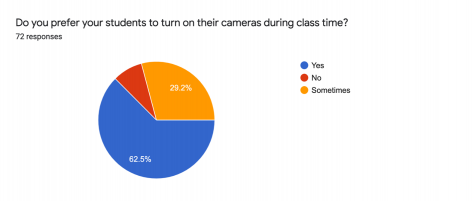
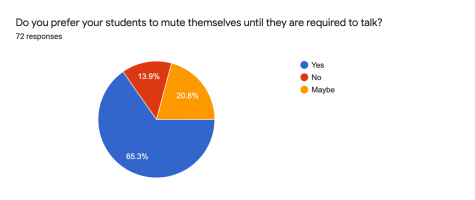
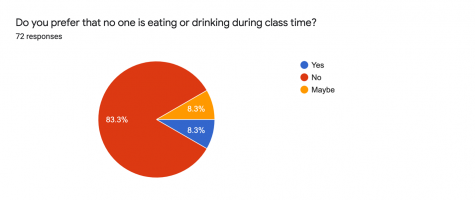
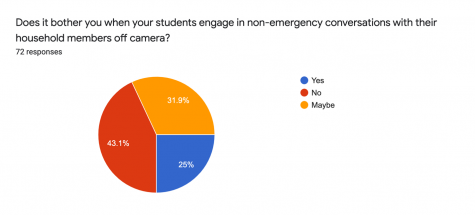
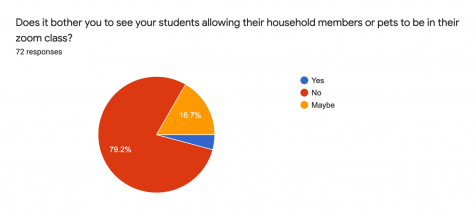
Anusha Manahil • Mar 15, 2021 at 12:28 pm
Hey Jae! Great article! The pandemic has brought an onset of revising the way we go about our lives and in the same way our education. Your article gives great insight to what an instructor feels or expects which makes us as students be more caring to their needs as they have been to ours.
PS. thanks for linking my article!